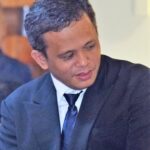
Christopher Maboloc
Teaching is the most noble profession. Jesus Christ was a teacher. Buddha was a teacher. Plato was a teacher.
There are two sides to the profession. The first has something to do with academics. The origin of the Academy, the one established by Plato, simply gathered those who wanted to debate on important issues under the shade of a tree. It was named after the Greek hero Akademus. Today, the academe is an institution where you learn the origin of universe, the meaning and theory of knowledge, including the humanistic role of the arts and the sciences. Learning is a system whereby the transfer of knowledge becomes possible by means of pedagogical tools and methods.
The other side to education is one that is rooted in its transformative role. In this way, John Dewey becomes important. For the American philosopher, we learn through experience. Students in this way must be immersed into practices that make them understand a skill set, be it in engineering, electronics, management or accountancy. Knowledge is in this regard is empirical. However, the same poses a dilemma. The reason there being is that education is not just about accepting the world for what it is. There are forces that undermine human freedom. Education, in this regard, is about the resistance to structural and institutional injustices.
What the above connotes is that one should not discriminate between knowledge as theory (episteme) and knowledge as skill (techne). Both serve a distinct and specific purpose. Theory is about putting together a universal way of understanding of reality. Principles are gathered to determine certain laws of nature. Their coherence results to a unified understanding of a reality. Skill on the other hand has something to do with accomplishing certain tasks, say building a skyscraper, digging deep into the seabed to extract petroleum, or even developing an atom bomb. Without Einstein’s theory, it would not be easy to predict how World War 2 might have ended.
This brings us to the original purpose of this essay. Both of my parents are teachers. They taught at a public high school. My two sisters are now teaching in the same school. Both of my parents are now retired. Some of the best people I know, from my HS days to college and graduate school, are in the teaching profession. If you want to understand the meaning of brilliance, don’t just look into the material accomplishment of people. Instead, know how they helped transform the lives of others. Don’t look down on individuals because you think their pay is low. That is just sheer arrogance.
Schools nowadays perform many tasks. There are two schools of thought when it comes to the social role of an academic institution. The first has something to do with it being a part of civil society. A school hence has a social and moral responsibility to contribute to the growth of society. But this is not limited to its impact in terms of the lives of its students. Schools must champion or be a catalyst for social change. Fr. Joel Tabora, SJ, exemplifies this in bringing Ateneo de Davao University closer into the public sphere on a host of critical issues, including environmental protection and preservation.
The other function has something to do with the strictly intellectual pursuits of an institution. The money that a private school has, for instance, is largely, if not wholly derived, from tuition payments. Such must therefore be used exclusively for the development of students, and not for society in general. This does not mean that a school is not contributing to a country’s progress. The students being the product of a school is its biggest contribution. This paradigm is more concerned with fiscal or financial restrictions in terms of how to use the budget of a school.
But the most interesting part about teaching is the freedom that it gives us. There is no bigger accomplishment in life than seeing your former students succeed. I actually invite my brightest students to join the government bureaucracy and help change Philippine society. My profession as a teacher, I must say, is the most beautiful job in the world. (Ryan Maboloc)


